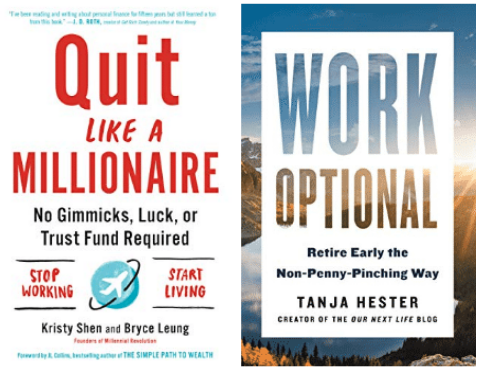I can’t remember exactly when, but somewhere after my first few paychecks at my first full-time job, I was really struck by the notion that the next 40 years was supposed to consist of me going to work every day to make money to pay bills and to take one week-long vacation. Rinse and repeat every year. Something about that just didn’t sit right with me. There’s a meme somewhere floating around the internet that says “I wasn’t born just to pay bills and die.” But this is literally how it seemed everyone around me was living.

Where it (probably) all began
In college, I decided to study abroad and lived in Milan, Italy for 4 months. I know everyone says it’s life changing, and for me it really was. It was eye opening. More than anything, it taught me not to accept what I saw in the U.S. as the only way to live a life. It inspired me to visit even more countries and see how others lived. It taught me to challenge my own assumptions and really define what I wanted my life to be like. I knew from that moment that I wanted travel to be a big part of my life. Even before I had a husband or kids, I made the decision to take my then nonexistent kids on a round-the-world trip by the time they were 10ish. I knew it was possible because I saw this family had done it. But noone around me thought this was feasible. “What job is going to give you that kinda time off?” “How much does that even cost?” And that’s when I started to question everything. Why would I give an employer 50 weeks and only get 2 to myself? For 40 years of my life. And, why would I save my big trips and my bucket list until 65? I hope I’m still in good physical condition by then. Hell, I hope I’m still alive by then, but why can’t I enjoy those things now?
Having kids changes things – but not in the way you think
Most people think that after having kids, you have to buckle down and you can’t travel anymore and now you have to make more money to save for college, etc. etc. etc. For me, it made me even more aware of how much of my life is devoted to my employer. The time between work and bedtime is limited and sometimes stressful because you’re dealing with pressures from work. Retiring “early” frees me up to be more present in my kids lives even at home. Not just for a round the world trip. It gives me the freedom to be there for school plays and whatever else is going on in their lives. My dad didn’t retire early, but he did work nights which freed up his days. Although my parents divorced when I was only 2 and I mostly lived with my mom until the teenage years, the thing I remember most about my dad is he was always “there.” Wherever I was, I knew I could count on my dad to be available. I want to have that same presence in my kids’ lives. If I play my cards right, early retirement is attainable in the next 10ish years. Just as my kids are entering high school and middle school. Just when my presence is going to be most valuable.
The most important number when it comes to retirement
At some point in the last 10-15 years, I discovered the FIRE (financial independence/retire early) movement. There was a whole world of people (mostly upper middle class, white men at that time) who had attained or were working towards this idea of financial independence. They realized that if you invested enough of your income, you could live off of returns from your investments and not be tied to a job. This is when it clicked to me that I had been thinking about retirement in terms of the wrong “number” all this time. I had been thinking of it as an age – 65 in the U.S. When in reality, it’s based on a different number, the amount of money required to support your lifestyle.
Retiring early isn’t for everyone
Even more important than early retirement was the notion of “financial independence” – some people actually enjoy working. But may not love their employer or the current circumstance or perhaps the thing they are passionate about requires a career change or a decrease in salary. Being able to make decisions without the largest deciding factor being finances was intriguing to me. Like, how? How do people live like this without being trust fund babies or coming up with some game-changing app or falling into a lump sum of money. In typical “me” fashion, when I am trying to figure something out, I read. Obsessively. I read lots of personal finance books, lots of blogs. Listened to lots of podcasts. I learned about millionaires next door, different investment strategies, mistakes that other people made along the way. I learned a lot. But I still wasn’t sure how I could make it happen – for me.
These books made it plain

After ten years of lots of learning, I found the two books that have made financial independence seem truly attainable for me: Work Optional: Retire Early the Non-Penny-Pinching Way by Tanja Hester and Quit Like a Millionaire: No Gimmicks, Luck, or Trust Fund Required by Kristy Shen. Both books put everything in plain English and provided realistic scenarios with real numbers. I have always said I was going to retire early or at a minimum not depend on W-2 income to sustain my lifestyle, but in the back of my mind I wasn’t really sure how it would all pan out. These two books gave me additional insight into the how and are provided me with the roadmap to actually make it happen. And they also reaffirmed my why. Here are some of the lessons that stuck with me from these books.
Financial independence is about more than the money
What I loved about both of these books is that they made it clear that financial independence was about more than just the money. It was about the “life” side of things. Many people say they don’t think they’ll ever retire because they feel they would get bored. My dad was the same way. He thought he would work up until he couldn’t anymore. Well, his job eliminated his position a couple of years ago (another reason it’s important to be financially independent of an employer), and he realized he was at the age where he could retire. He decided to just try it out and not get another job right away. And now he says he can’t imagine life any other way. He doesn’t know what he was thinking. Most of his days are spent playing chess online, teaching himself music on his keyboard and bass guitar, Facetiming me and the kids, watching some of his favorite old shows, and still just whatever he wants to do. Pre-Covid he would volunteer, travel, or come and hang out with us for weeks at a time. He loves it.
And that’s what’s most important – the time. In Quit Like a Millionaire, she explains the idea of the freedom mindset. It’s about buying back your time. Having the freedom to spend your time however you choose.
Before Work Optional explains a single calculation or investment strategy, you start with exploring the “why”? She introduces the Master Work-Optional Life Questionnaire where you consider what you want your life to look like, what are the things you enjoy doing, how you plan to maintain social connections without a job, etc. etc. etc. And it again reinforces the idea that you don’t start with the how, you start with they why.
How much you earn isn’t the most important thing
One of the things I loved most about Quit Like a Millionaire is that she has achieved financial independence at a young age although she was born into poverty. I mean literal “digging through piles of medical waste in rural China for fun” poverty. What both of these books highlight is that it really isn’t about how much you earn, it’s about how much you save. If you earn $60,000 a year and spend $45,000 a year to live, you are potentially in a better financial position than someone who earns $250,000 but turns around and spends $240,000 (because of lifestyle creep or whatever else). Even if you never earn a six-figure salary, making wise investment decisions with the amount you do save can help you achieve financial independence.
Enjoying the early retirement ride
The other thing I really liked about Work Optional is that she acknowledges that if you don’t enjoy the ride to early retirement, it’s not going to be worth it. So many people try to scrimp and save a dollar here or a dollar there and live a miserable life trying to be frugal to attain financial independence. But who wants to do that?! Instead, you define your money mission statement and identify the things you are going to spend money on guilt-free (travel for me), and the things that are less important to you that you don’t spend money on (mediocre restaurants). You also identify what it is you like out of the things you spend money on and decide if there are other ways to get those outcomes. One of the examples that stood out the most from the book is that she loves fine dining. She would often take trips just to try out particular restaurants. She admitted to racking up a $1,000 bill for one meal between her and her partner (girl, wut). She took a step back and realized what it is she liked about that experience and found ways to still enjoy that but without the hefty price tag. So now, she still enjoys fine dining, but maybe they share a dessert instead of trying all three on the menu. I love that she promotes saving, but says you don’t have to live like a pauper.
Thinking outside the box
What I loved about both books is how the examples and scenarios challenged my assumptions about what was possible or things I believed. In Quit Like a Millionaire, she has a whole chapter titled “Your House is Not an Investment.” And… I’m not going to go into that debate here, but it’s totally worth the read. In Work Optional, one family decided not to save for their kids’ college education expenses while they’re in the accumulation phase, and instead put everything towards their own retirement investments. Then when they are financially independent, any additional income from that point forward will be for their kids’ education. And I could totally see myself adopting an approach like this. Maybe not exactly the same, but it opened my eyes to new ways to allocate my income. Since we’ve already begun to save for their college and have a pretty decent chunk invested, I’d be comfortable with stopping new contributions, letting those funds continue to grow, and picking contributions up again in 10 years or so. I don’t know that I would be comfortable with this approach if I had zero saved up for them, but it’s just something else to think about. I didn’t agree with everything that was suggested in Work Optional (example, her view of HSAs hasn’t proven true for me and I didn’t see the research that she referenced), but overall, I really valued the way these books prompted me to evaluate the beliefs I hold around finances and my approach to early retirement.
Plugging in my own numbers

If you only read one of these books, I’m going to say start with Quit Like a Millionaire. She takes the entire process and explains it from A to Z. There are so many terms and strategies that are just thrown around in the financial independence world, and she lays them all out so clearly. From investment decisions, to tax strategies, the 4 percent rule, drawdown strategies, backdoor roth conversions (I hear this so much and always like huh???), the yield shield, etc. There is a whole section on taxes – one chapter titled “Taxes are for Poor People” and the other called “Never Pay Taxes Again.” I mean just, break it all the way down for us then, Kristy.
Between the strategies in Quit Like a Millionaire and the worksheets on Work Optional’s companion website, www.theworkoptionalbook.com, I was able to plug in my own numbers and can now build my own personal roadmap based on my financial situation. Although I have often said I’m going to retire early, it was amazing to see that it really is possible in 10ish years doing pretty much what I’m doing now. Blew my mind.
So I hope the next time someone mentions retiring early, you don’t look at them as if they have three heads. Or even worse, you automatically decide it’s something that’s not possible for you. It absolutely is. I hope you check out these two books or some of my honorable mentions below to dig a little deeper.
Check these out
Here are some of my favorite black content creators who continue to inspire me when it comes to financial independence.
- Rich and Regular blog – They are my friends in my head. Our kids are friends, too.
- Our Rich Journey YouTube channel – So much good content. They retired before 40, moved to Portugal with their two kids, and are just… motivation (happy sigh).
- Journey to Launch podcast – I haven’t listened lately, but what I love most about her podcast is the platform she provides to other people of color in this space.
And as far as personal finance books go, an honorable mention goes to The Simple Path to Wealth by JL Collins. This book is like the “godfather” of the financial independence movement, so some people will probably gasp at it just being an honorable mention for me. It absolutely lays out the most widely accepted wealth-building strategy. It was the first book that I read that did the math to show why investing in low-cast index funds is the most simple and predictable path to wealth. But it’s kinda dry if I’m honest. But that’s the thing about building wealth using these strategies – it’s not exciting. It’s intentionally boring. But this book does introduce the concept of F-U money. And yes, it means exactly what you think it means.
When you’re ready to say F-U to this traditional concept of working hard for 40 years and then reclaiming your time, give these books a whirl!




I love this Deidre and it really inspires me! I have been talking the same talk for years and I feel like people think I’m crazy and unappreciative but this cannot be life! I love my husband and kids and even the core of the work I do with youth, but since I’ve had kids, just like you, I value the quality of my life more. I will definitely read those books to learn more. Also, my OBGYN referred 123 Magic to me a few months back and said it was life changing for her and her husband’s parenting style. I started reading back then and so far so good but put it down so me and hubby could read together. Definitely delayed the process but going to pick it back up. Glad to know someone else vouches for it too. ?
Yesss! I feel like we are on similar wavelengths. Let me know what you think about 123 Magic, too! Thank you for reading 🙂
Thank you for this!!! I feel ashamed for saying it out loud but so much of this stuff goes over my head! Going to start with Quit Like A Millionare.
You totally shouldn’t be ashamed!! Noone taught us this stuff when it comes to our personal lives. Business finances? Yes! But in general we only scratch the surface when it comes to using finances strategically to build our own wealth.